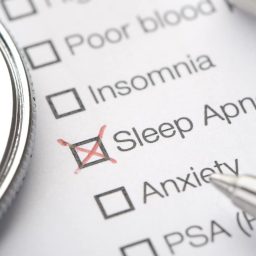Getting a good night’s rest is important for your mental and physical well-being. But more than 20 million Americans wake up feeling just as tired as before they went to bed because of a condition called sleep apnea. One of the telltale signs of this disease is snoring.
What Is Sleep Apnea?
Sleep apnea is a condition that occurs when your throat constricts your breathing temporarily throughout the night. While your sleep your brain goes into an “off-duty” mode. But when you are not getting enough oxygen, your brain gets alerted. Your brain will tell your lungs to breathe, your oxygen levels will normalize and your brain will stand down – until the same thing happens again only a few minutes later.
This cycle will continue, unbeknownst to you, throughout the night.
Dr. Federico Cerrone, the medical director of Sleep and Breathing Disorders for Atlantic Health System explains, “Basically, your body’s working all night.”
How Do You Know It Is Time to Seek Treatment?
Daytime sleepiness is the most common reason why people visit their ear, nose and throat doctor.
While snoring is a common symptom of sleep apnea, they two do not always go hand in hand.
“Not everyone who snores has sleep apnea — although probably a third to 40% do,” Dr. Cerrone said. “But does everyone who has sleep apnea snore? Yes. It doesn’t have to be a house-rocking noise. It could just be a gentle puffing.”
How Is Sleep Apnea Diagnosed and Treated?
While a bed partner’s complaint may get a patient in the door, a proper diagnosis is still needed before they can receive treatment.
After completing a physical exam and reviewing your medical history, your doctor will order a sleep study. There are two options when it comes to sleep studies. The first is spending an evening in a sleep study center. This is usually recommended if your doctor suspects multiple causes to your symptoms, as the sleep center can gather more data.
The second option is an at-home sleep study. This option involves connecting the monitor while in the comfort of your home, with instructions from your doctor on how to do so.
The test results record the number of sleep apnea episodes you experience per hour. Less than five is considered normal. Five to 15 episodes is mild, 15 to 30 is moderate and anything above 30 is categorized as severe sleep apnea.
Lifestyle changes such as losing weight, quitting smoking and avoiding alcohol before bed may be able to treat mild cases of sleep apnea.
Moderate and severe sleep apnea requires a continuous positive airway pressure (CPAP) machine. According to Dr. Cerrone, “A lot of people come in with the attitude of, ‘I’m not using that machine.’” He then “ask[s] them to just try it. Try it for a month or two. And most people, when they try it, they feel better.”
If you snore, it may be a sign of a more serious condition. Contact the experts at Albany ENT & Allergy Services today to learn more.
